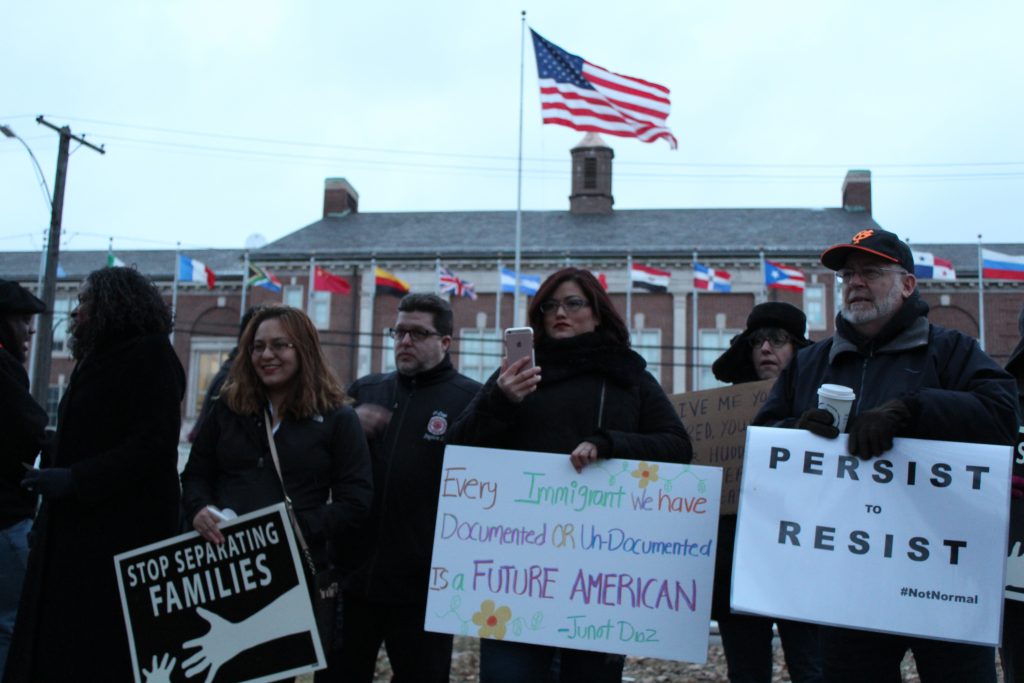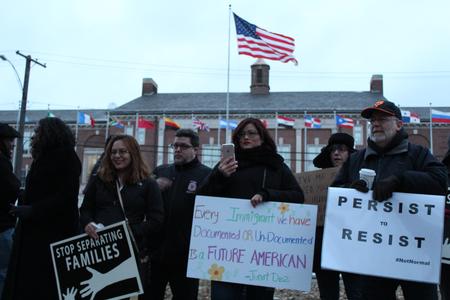President Trump Has Not Touched Policy That Creates Opportunities for Undocumented Millennials
Detroiters with Deferred Action for Childhood Arrival status share what the controversial program has meant for them.

Angela Martinez is one of nearly three quarters of a million young adults who have essentially told the federal government they are here illegally.
The 18-year-old Detroiter is among those who’ve come out of the shadows to sign up for the Deferred Action for Childhood Arrivals or DACA program.

“I think it makes me feel more like I fit in or I’m able to do things that I’m supposed to be able to do but can’t just because I’m undocumented,” says Martinez. “It gives me some sort of feeling like I belong.”
The DACA program does not make Martinez a citizen or put her on a pathway to citizenship. But it enables young undocumented immigrants like her to apply for a temporary work permit, driver’s license and social security number. Under the program, Martinez is eligible for in-state tuition at Michigan colleges and universities, which will come in handy if she chooses to go to the University of Michigan, one of the colleges that accepted her. She’s also been able to legally work at the Michigan Science Center, a law firm in Royal Oak, and the Detroit Zoo.
“If I hadn’t had DACA, I wouldn’t be able to do any of them,” she says. “I know I’m Mexican but most of my roots are here and my traditions. I really don’t know anything other than being American.”
With President Trump’s aggressive immigration enforcement policies since he took office, many immigrants like Martinez have been anxious about the future of the DACA program. The Obama administration implemented in 2012, circumventing the legislative process after Congress failed to pass the DREAM Act. Like DACA, that measure would have created higher education and work opportunities, but additionally it would have created a pathway to citizenship.

Proponents of the failed bill say that so-called “DREAMers” like Martinez suffer the consequences of being brought here illegally by their parents. When DREAMers grow up they are stuck in limbo. Proponents argue these young adults can’t legitimately work toward the American dream.
“The struggles have made me who I am.”
Adrian, an undocumented 27-year-old who asked to use a pseudonym because of his status, said even with his DACA permit life is hard. He’s not eligible for the Affordable Care Act or federal student loans and grants, and he says, for the most part, he cannot leave the United States.
“I can only leave the country in three different situations, one being school, the other one being work and the other one being like a family member dying or something like that. But even then I have to apply for a special permit,” he says.
Adrian came here from Mexico with his family when he was 14. He says his family was not able to obtain permits or visas so they flew to Canada and then used other people’s documents to come over the Ambassador Bridge and enter the U.S. illegally.
Once inside, he realized, America isn’t quite what he thought it would be like.
“From the outside everybody looks at the United States as something huge and amazing and all this American dream ideology right? And you know coming here and then facing the different realities, it was different,” says Adrian.
He says racial issues, discrimination against people of color, and an unstable school system are all things he didn’t expect to see in this country but that he now knows are realities. But that doesn’t mean he wishes he didn’t make the trip.
“I wouldn’t change all the things that I have experienced here, and what I have learned in this country, what I have seen, the people I’ve met,” Adrian says. Even the struggles, he says he’d keep them. “I think the struggles have made me who I am.”
Being fair to Americans
But struggles or no struggles, opponents point out that people like Martinez and Adrian are not supposed to be here at all, and they say programs like DACA reward families for breaking the law. Tamyra Murray, an organizer for the group Michiganders for Immigration Control and Enforcement, says the DACA policy encourages immigrants to sneak into the United States.
“If we continue to do this, parents will keep bringing their kids and bringing them, it will never stop,” says Murray.
“What if we were to say ‘I think all people with blonde hair should not have to buy car insurance,’?” she postulates. “Would that be fair to the rest of the people with brown or black hair?”
For Murray, this is about being fair to Americans. She worries that undocumented immigrants take away jobs and cost taxpayers money. She says the United States should keep its word and honor DACA status for those who currently have it, but just until their two-year permits run out. Meanwhile she says the government should stop admitting new applicants.
“We should end the DACA program because it is unlawful. There is already provisions in place for people to get citizenship,” she says.
But those provisions may not be feasible for a lot of people who want to legally enter or remain in the U.S.
Michigan Immigrant Rights Center Supervising Attorney Ruby Robinson says the American immigration system is complicated. “It is very difficult for many people who are currently here in the United States to simply get in line or to pay a fee to fix their immigration status,” he says, and sometimes, in order to properly apply, applicants have to leave the country for 10 years or more and then come back.
Even so, Robinson says he’s seen more clients initiate the naturalization process since Trump was elected. At the same time, he says he’s seen hardly any DACA applications. That may be because some immigrants fear the program will be used as a deportation registry.
Security at “home”

Israel, an undocumented 26-year-old who asked to just have his first name used, says applying for DACA was a terrifying time in his life
“I was hiding you know. You’re an immigrant, you hide,” says Israel. “Then all of a sudden it’s like, ‘We’re going to get your address. We’re going to get the people who live with you. Do they have papers? Do they not have papers?’
“It was a risk. I saw it was a risk.”
Because DACA participants are not United States citizens, they do not receive the perks reserved for that status.
“We talk about voting, we talk about running for office and everything else,” Attorney Robinson says. “Really the greatest benefit of citizenship is being secure from deportation.”
But DACA status still has its perks.
“As soon as I got it, it was life changing” Israel remembers. “I could help. I could help in a better way.”
White House Secretary Sean Spicer said in a press conference last week that DACA participants are not specifically being targeted right now. He also said that everybody who is here illegally is subject to removal at any time. NPR has reported that a DACA student Seattle, Washington is being detained by U.S. Immigration and Customs Enforcement..
